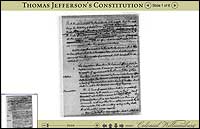"One of the most intriguing might-have-beens in American History"
Jefferson's Tardy Constitution
by Jack Lynch
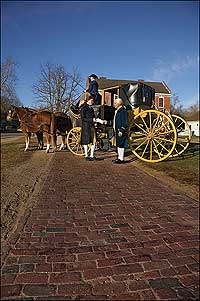
In Philadelphia, Thomas Jefferson hands George Wythe his draft for a Virginia constitution. Sean Dixon Gumm is Jefferson, left, and Jack Flintom is Wythe, with Mellanee Ann Laren on the coach.
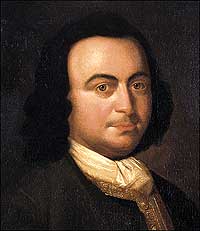
Four Virginians who had a hand, small and large, in producing a state constitution and bill of rights at the fifth Virginia Convention. George Mason drafted the state bill of rights and constitution.
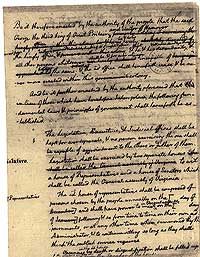
Jefferson's draft of a state constitution divided government into legislative, executive, and judicial branches.
Americans are so accustomed to associating Thomas Jefferson with the nation's founding documents that they easily overlook that he played no hands-on role in composing the United States Constitution. While it was being drafted in 1787, he was three thousand miles away in France. It wasn't the only chance to write a constitution that Jefferson missed. The fifth Virginia Convention, which included George Mason, James Madison, and Edmund Randolph, came together in Williamsburg in the spring of 1776 to begin work on a "Declaration of Rights" and a "Form of Government." Many consider the resulting document the world's first modern constitution, and it would soon have great influence on the federal Constitution. But while Jefferson's home state was debating its form of government in the spring and summer of 1776, he was in Philadelphia, focusing his attention on national rather than state business.
Jefferson was not wholly satisfied with either of the documents adopted in his absence. Virginia's constitution prompted a series of objections in a letter to Edmund Pendleton in August 1776. In spring 1783, Jefferson called for a state constitutional convention, as he wrote to Madison: "A Convention for the Amendment of our Constitution having been much the subject of conversation for some time, I have turned my thoughts to the amendments necessary. The result I inclose you." Nothing came of it. He later decided to go public with his reservations, writing in his Notes on the State of Virginia that "This constitution was formed when we were new and unexperienced in the science of government" before enumerating the "very capital defects in it."
The federal Constitution, he was convinced, was also far from perfect. He recorded his first impressions November 13, 1787, in a letter to William S. Smith: "There are very good articles in it: & very bad. I do not know which preponderate." More details about the good and bad articles followed in a letter to Madison on December 20. "I like much the general idea of framing a government which should go on of itself peaceably, without needing continual recurrence to state legislatures," he wrote. "I like the organization of the government into Legislative, Judiciary & Executive. I like the power given the Legislature to levy taxes...I am captivated by the compromise of the opposite claims of the great & little states." Then he listed "what I do not like," beginning with "the omission of a bill of rights." More disturbing for Jefferson was "the abandonment in every instance of the necessity of rotation in office." Experience had convinced him that, without term limits, every elected official will be "an officer for life." That Constitution's neglect of this problem was for him a nearly fatal flaw.
Jefferson was not shy about expressing the defects he perceived in two of America's most important documents. What would he have proposed in their place? As it happens, we need not guess because Jefferson left behind him one of the most intriguing might-have-beens in American history: a draft constitution for Virginia that was never debated. It's odd that such an important document is so little known. A version was published in the Richmond Enquirer in 1806, but that was forgotten for decades. Only in 1890 did the original handwritten drafts turn up near Lexington, Massachusetts. Published in 1892, they have attracted little attention. Only a few histories of America or biographies of Jefferson give them more than a passing mention.
Jefferson was serving in the Second Continental Congress in the spring and summer of 1776, working most famously on the Declaration of Independence, but he had not forgotten his home state. As he recollected in 1825:
I was then at Philadelphia with Congress; and knowing that the Convention of Virginia was engaged in forming a plan of government, I turned my mind to the same subject, and drew a sketch or outline of a Constitution, with a preamble, which I sent to Mr. Pendleton, president of the convention, on the mere possibility that it might suggest something worth incorporation into that before the Convention.
The "mere possibility," though, was not to be: Jefferson's draft arrived too late. The constitution prepared by George Mason and amended by others had already been adopted. This text "had been so long in hand, so disputed inch by inch, and the subject of so much altercation and debate; that they were worried with the contentions it had produced, and could not, from mere lassitude, have been induced to open the instrument again." It's not difficult to detect the annoyance in Jefferson's tone—he seems offended by the delegates' laziness—but by then nothing could be done about it.
Not all was lost. Jefferson recorded that the convention, "being pleased with the Preamble to mine, ...adopted it in the House, by way of amendment to the Report of the Committee; and thus my Preamble became tacked to the work of George Mason." And anyone who reads this preamble, with its long list of complaints against George III, will notice the similarities to the Declaration. Jefferson said that "the Preamble was prior in composition to the Declaration: and both having the same object, ...they used necessarily the same materials of justification, and hence their similitude." The preliminaries to Jefferson's constitution, then, made it into two official documents. But all his proposed details about the organization of a government and the rights of its citizens were ignored.
Jefferson's constitution survives in a rough draft and a fair copy. Both bear the title "A Bill for new-modelling the form of Government and for establishing the Fundamental principles thereof in future." It's not always reasonable to compare it to the national Constitution; designing the government of a single state, he did not have to worry about balancing the interests of small states, large states, and the federal government, all concerns of great consequence in the federal Constitution of 1787. But the constitution he drafted does provide insights into the shape he thought an American government should take.
The similarities between Jefferson's draft constitution and the federal Constitution can sometimes be striking. Like the delegates at the Constitutional Convention, Jefferson argued, "Legislation shall be exercised by two separate houses, to wit a house of Representatives, and a house of Senators." Like them he wrote, "The sd house of Representatives shall be composed of persons chosen by the people." He said the senators should "be appointed by the house of Representatives," and this, too, is similar to the United States Constitution, which originally provided that "the Senate of the United States shall be composed of two Senators from each State, chosen by the Legislature thereof"—only with the Seventeenth Amendment, ratified in 1913, did the people begin to elect their senators directly. And in insisting that "all persons shall have full and free liberty of religious opinion; nor shall any be compelled to frequent or maintain any religious institution," he anticipated not only the First Amendment but Article 16 of George Mason's Virginia Declaration of Rights: "All men are equally entitled to the free exercise of religion."
The differences, though, may be more interesting than the similarities. The federal Constitution puts an electoral college between the people and the chief executive, but Jefferson went further: "One person to be called the shall be annually appointed by the house of Representatives" (later he filled in "Administrator"). This administrator "shall possess the power formerly held by the king: save only that, he shall be bound by acts of legislature." Among the limitations on his power: "He shall have no negative on the bills of the Legislature." By negative, Jefferson meant veto. The administrator was to be unable to dissolve or adjourn the legislature, to declare war or call up the armed forces, or to coin money. "These powers," Jefferson wrote, "shall be exercised by the legislature alone." He proposed strict term limits: "When once removed," Jefferson wrote of the senators, "they shall be forever incapable of being re-appointed to that house." Likewise the administrator, who "after having acted one year shall be incapable of being again appointed to that office until he shall have been out of the same three years."
Some of the most intriguing passages appear in Article 4, "Rights, Private and Public." Jefferson spelled out property rights in detail, writing, for instance, "No lands shall be appropriated until purchased of the Indian native proprietors." He also favored restrictions on the death penalty:
The General assembly shall have no power to pass any law inflicting death for any crime, excepting murder, & those offences in the military service for which they shall think punishment by death absolutely necessary: and all capital punishments in other cases are hereby abolished. Nor shall they have power to prescribe torture in any case whatever.
And Jefferson would use the constitution to outlaw standing armies in times of peace. Subsequent American history would no doubt look very different had these policies been the law of the land.
Some of the policies superficially similar to the national Bill of Rights have some significant differences. "No freeman," wrote Jefferson, "shall be debarred the use of arms within his own lands"—a small but telling difference from the Second Amendment. "Printing presses shall be free," he wrote, "except so far as by commission of private injury cause may be given of private action." Freedom of speech, on the other hand, is not addressed anywhere.
The most striking difference between Jefferson's constitution and any of the ratified constitutions is another clause in that same Article 4: "No person hereafter coming into this country shall be held within the same in slavery under any pretext whatever." Slavery was much on Jefferson's mind in 1776. In an early draft of the Declaration he added to his list of George III's crimes that "he has waged cruel war against human nature itself, violating its most sacred rights of life and liberty in the persons of a distant people who never offended him, captivating & carrying them into slavery in another hemisphere, or to incur miserable death in their transportation thither." This passage had influential supporters: John Adams, for instance, considered it the best part of the document. But Adams and Jefferson did not have the votes, and the newly independent United States had no policy banning slavery.
Jefferson's plan for a Virginia constitution in 1783 went further, not merely ending the slave trade but emancipating all slaves in the state: "The General assembly shall not have to power to ...permit the introduction of any more slaves to reside in this state, or the continuance of slavery beyond the generation which shall be living on the 31st day of December 1800; all persons born after that day being hereby declared free."
It's tempting to imagine what might have happened to Jefferson's constitution had it been introduced in time for discussion and debate, whether in Williamsburg in 1776 or in Philadelphia in 1787. An America that banned slavery, an America that spelled out the rights of natives, an America that outlawed most capital punishment, an America without a standing army, or an America where sitting politicians could not run for reelection would be very different from the one we inherited. Had he been involved in the debates, Jefferson might have lost some battles he considered important, and others might have persuaded him that some of his ideas should be amended. We'll never know. We should, however, recall that this long-forgotten draft constitution offered an alternative view of government that might have had profound consequences over the last 230 years. It's probably healthy to be reminded that many of the principles we now regard as fundamental, even self-evident, might have turned out differently had a letter from Philadelphia to Williamsburg arrived just a few days earlier.
Jack Lynch, author of The Age of Elizabeth in the Age of Johnson (Cambridge University Press, 2003), is associate professor of English at Rutgers University in Newark, New Jersey. He contributed to the winter 2007 journal a story on the Alien and Sedition Acts.
Suggestions for further reading:
- Richard B. Bernstein, Are We to Be a Nation? The Making of the Constitution(Cambridge, MA, 1987).
- Charles T. Cullen, "Thomas Jefferson: Writings on the Constitution," This Constitution 13 (1986): 27–33.
- Donald S. Lutz, The Origins of American Constitutionalism (Baton Rouge, 1988).
- Kate Mason Rowland, "A Lost Paper of Thomas Jefferson," William & Mary Quarterly 1, no. 1 (July 1892): 34–45.
- Malcolm Sylvers, "Thomas Jefferson and the Constitution," Storia nordamericana 4, nos. 1–2 (1987): 121–36.
- Thomas Jefferson, Draft Constitution for Virginia.

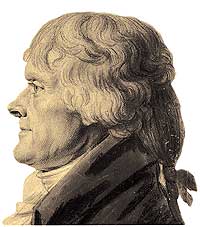
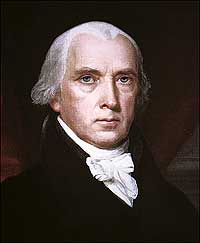
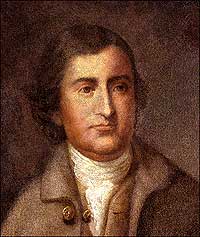
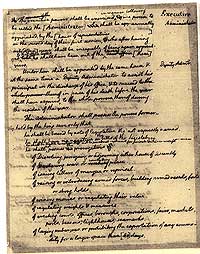
![No lands shall be appropriated until purchased of the Indian[s].](/Foundation/journal/Spring07/images/Cons_5a_sm.jpg)
![No lands shall be appropriated until purchased of the Indian[s].](/Foundation/journal/Spring07/images/Cons_5b_sm.jpg)
